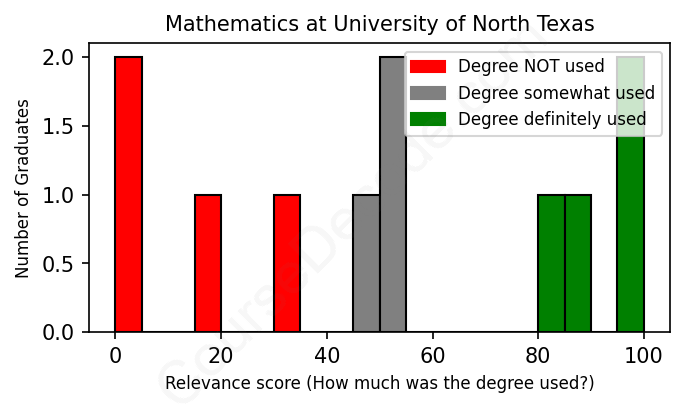
First, some facts. Of the Mathematics graduates from University of North Texas we've analyzed , here's how many have used (or NOT used) their degree in their career:

These are estimates based on AI analysis of 11 LinkedIn profiles (see below).
The verdict? Significantly below average. Overall, with an average relevance score of 51%, Mathematics graduates from University of North Texas have a much lower likelihood (-16%) of finding work in this field compared to the average graduate across all fields:
And for comparison, here's the chart for all profiles we've looked at across all degrees.
Also, after graduating, only 18% of these graduates have pursued further education other than another Bachelor's degree (such as a Masters degree or other), compared to the average across all profiles of 35%. This suggests a Bachelors degree is enough for most Mathematics graduates, and it's normal to look for work straight after graduation.
See the details:
|
Relevance score: 50% We think this person has gone into a career only somewhat relevant to their degree. We think this person has gone into a career only somewhat relevant to their degree.
DEGREE INFOGraduated in 2014 from University of North Texas with a Bachelor of Applied Science - BASc in Mathematics. No other secondary education since. JOB HISTORY SINCE GRADUATIONTechnical Product Marketing RudderStack Jan 2024 - Present ABOUTNo information provided. |
The top 10 most common jobs done by the graduates we've analyzed (ranked most common to least) are:
From the profiles of graduates who studied Mathematics at the University of North Texas, it looks like a lot of them have ended up in teaching roles, particularly as math teachers at various high schools. Positions like "Algebra I Teacher" and "Secondary Mathematics Teacher" are common, and these roles definitely require a solid understanding of math concepts. These educators are directly applying what they learned in their degree programs, which shows a strong relevance to their math background. There’s also a trend where some graduates have taken on adjunct teaching roles or roles in educational administration, which still connects back to their math expertise, even if they are not strictly teaching math.
On the flip side, not all graduates are using their math skills in jobs that are clearly math-centric. Some have found themselves in marketing, data entry, or even positions like warehouse workers, where mathematical skills are not prominently required. While certain aspects of analytics and data interpretation might benefit from a math degree, these roles do not directly apply mathematics on a daily basis. This mix of direct and indirect applications suggests that while a math degree opens up certain paths, graduates may also explore a broader range of career options that are not strictly math-related. Overall, it appears that teaching is the most common and relevant field for these graduates, while other jobs vary significantly in their connection to math skills.
Here is a visual representation of the most common words in job titles for Mathematics graduates (this is across all Mathematics graduates we've analyzed, not just those who went to University of North Texas):

Looking at the career trajectories of graduates from the University of North Texas with a Mathematics degree, it's clear that many ended up in education or roles related to teaching. A significant number of them took on positions as mathematics teachers in various school districts, which suggests that for many, teaching was a natural choice right after graduation. For instance, graduates from 2012 to 2015 predominantly moved into teaching roles, with some even taking up positions as adjunct faculty and founding educational initiatives. This shows a commitment to using their mathematics background in a way that positively impacts others, particularly in the education sector.
However, as we move further down the timeline, the paths start to diversify quite a bit. While some individuals have maintained a clear thread in the education field, others have branched out into unrelated areas such as data entry, general clerical work, or even social media influencing. This implies that not all graduates found immediate or long-term success in mathematics-related fields, with some potentially struggling to leverage their degree effectively. In the long haul, after 5 to 10 years, we see a mix of those staying true to their mathematical roots in teaching and others who seem to drift into more generic roles that could be filled by graduates from any discipline. Overall, it's a mixed bag; while many are doing great things in education, others appear to be wandering off into positions that don't fully utilize their math skills.
Getting a Bachelor’s degree in Mathematics at the University of North Texas—or really at any school—can be pretty challenging, but it totally depends on your strengths and interests. If you enjoy diving into complex problems, working with abstract concepts, and have a good grasp of algebra and calculus, you might find it manageable. However, the coursework can get intense, with topics like real analysis and abstract algebra that might feel a bit abstract or overwhelming at times. Generally, a math degree is considered to be on the harder side when compared to other majors since it often requires a lot of logical thinking and problem-solving skills. But if you’re passionate about math and willing to put in the effort, it can also be a really rewarding experience!
Most commonly, in the LinkedIn profiles we've looked at, it takes people 5 years to finish a Bachelor degree in Mathematics.
Looking at these graduates from the University of North Texas, it seems like they’ve had a mixed bag when it comes to making decent money. Teachers, like the ones who graduated in 2012 and 2015, often start off with lower salaries—usually around the mid to high $30,000s—so their earnings might not be that great compared to some other professions. On the other hand, the ones who moved into technical marketing or management roles, like the 2014 grad at RudderStack or the 2021 grad at Amazon, likely make a fair bit more, possibly starting in the $50,000s or higher. Plus, the few who ventured into entrepreneurial roles or unique career paths, like social media influencing, could potentially see varied income, depending on their success. Overall, it looks like not everyone is banking big bucks, but there are definitely some paths that could lead to better pay as they gain experience.
Here is a visual representation of the most common words seen in the "about" section of LinkedIn profiles who have a Bachelor degree in Mathematics (this is across all Mathematics graduates we've analyzed, not just those who went to University of North Texas). This may or may not be useful:

Here are all colleges offering a Bachelor degree in Mathematics (ordered by the average relevance score of their Mathematics graduates, best to worst) where we have analyzed at least 10 of their graduates:
| College | Score | Count |
|---|---|---|
 University of Florida University of Florida
|
83 | 11 |
 Penn State University Penn State University
|
74 | 13 |
 The University of Texas at Austin The University of Texas at Austin
|
68 | 23 |
 University of Washington University of Washington
|
68 | 27 |
 University of California, Berkeley University of California, Berkeley
|
66 | 10 |
 University of Minnesota-Twin Cities University of Minnesota-Twin Cities
|
65 | 15 |
 California Polytechnic State University-San Luis Obispo California Polytechnic State University-San Luis Obispo
|
64 | 11 |
 University of North Texas University of North Texas
|
51 | 11 |
 University of California, Riverside University of California, Riverside
|
44 | 11 |